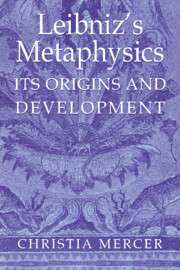Book contents
- Frontmatter
- Contents
- Acknowledgments
- References to Leibniz's works
- Introduction: first truths and half truths
- PART ONE METAPHYSICS OF METHOD
- PART TWO METAPHYSICS OF SUBSTANCE
- PART THREE METAPHYSICS OF DIVINITY
- PART FOUR METAPHYSICS
- Appendix I (Not exactly) First truths
- Appendix II Leibniz's original assumptions
- Bibliography
- Index Locorum
- Index
Appendix II - Leibniz's original assumptions
Published online by Cambridge University Press: 12 March 2010
- Frontmatter
- Contents
- Acknowledgments
- References to Leibniz's works
- Introduction: first truths and half truths
- PART ONE METAPHYSICS OF METHOD
- PART TWO METAPHYSICS OF SUBSTANCE
- PART THREE METAPHYSICS OF DIVINITY
- PART FOUR METAPHYSICS
- Appendix I (Not exactly) First truths
- Appendix II Leibniz's original assumptions
- Bibliography
- Index Locorum
- Index
Summary
I present here a brief account of the assumptions uncovered in the textual analysis of each chapter. In an attempt to distinguish between the early assumptions and the mature tenets, I have capitalized the former.
Chapter 1: Eclecticism and conciliation, 1661–68
The Metaphysics of Method assumes that the true metaphysics will be constructed from the underlying truths in the great philosophical systems, will be consistent with Christian doctrine and the claims of revelation, and will explain the phenomena (including the new experimental findings).
The Rhetoric of Attraction attempts to engage the sectarian reader by using agreeable philosophical terminology and by extolling the virtues of the reader's sect while attracting attention to the virtues of other philosophical schools; ultimately the goal is to entice the reader to consider the underlying (and usually unstated) assumptions, which Leibniz considers to be true and which he thinks will eventually lead the reader to philosophical enlightenment and intellectual peace.
Chapter 2: Aristotelian assumptions, 1668–69
The Principle of Self-Sufficiency assumes that a being S is self-sufficient if and only if the complete ratio for its features can be discovered in the nature of S. (In 1668, Leibniz is almost certainly here concerned only with primary features.)
The Principle of Substantial Self-Sufficiency assumes that a being S is a substance if and only if S is self-sufficient.
- Type
- Chapter
- Information
- Leibniz's MetaphysicsIts Origins and Development, pp. 477 - 484Publisher: Cambridge University PressPrint publication year: 2001

